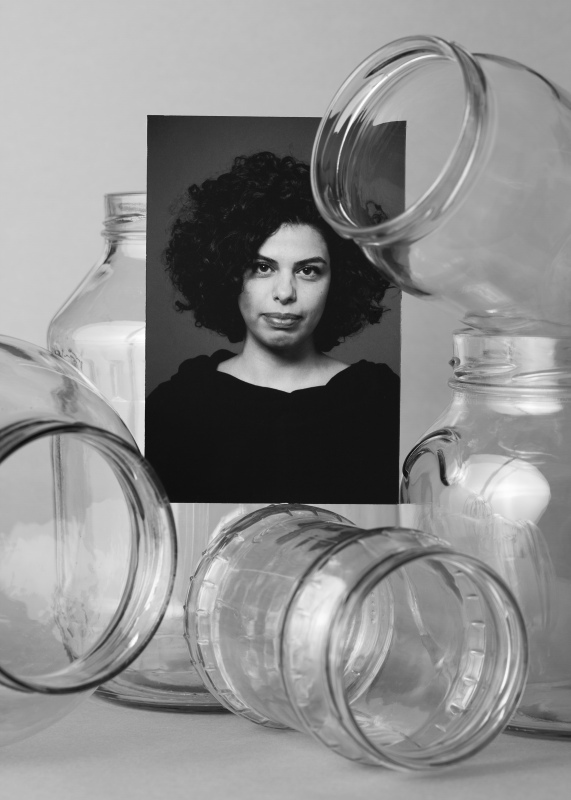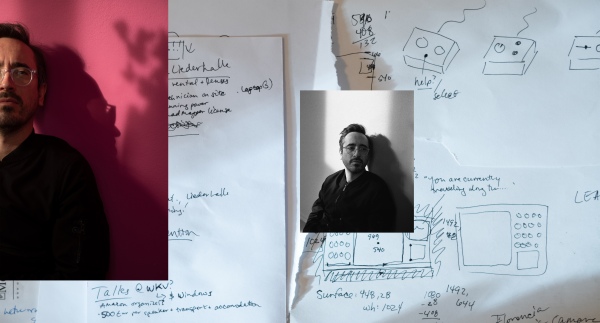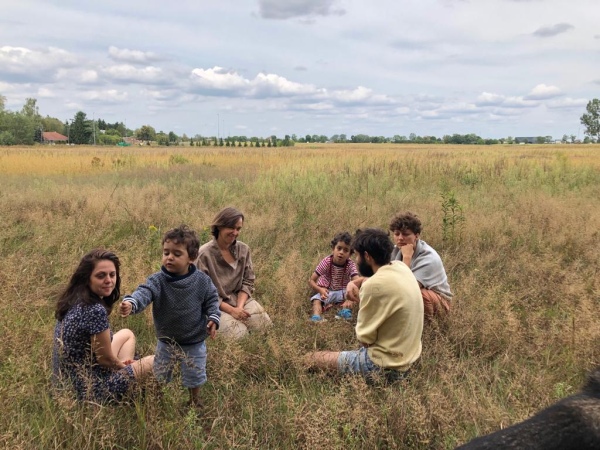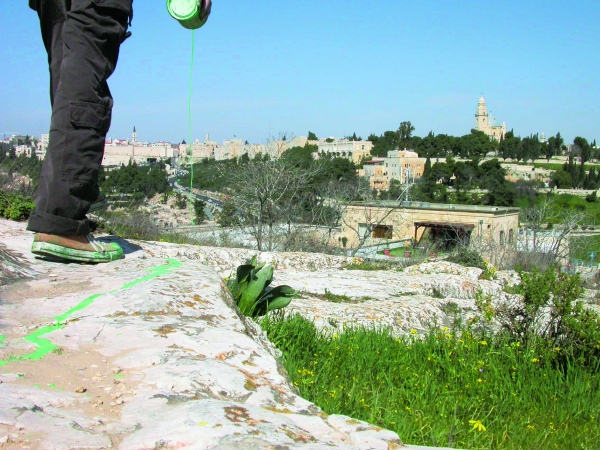My menus are disappearing recipes
Mirna Bamieh in conversation with Bogna Świątkowska
-
Bogna Świątkowska: Do you consider yourself a Palestinian artist? Do you need this adjective, this descriptive part about what kind of artist you are?
- Mirna Bamieh: No, it is always an exploration. What excites me are the questions, playing around with them without wanting to find the answers. Three years ago I would never have thought that I would create a project called the Palestine Hosting Society. But I did. It changed my life, and in another three years my life will also be different again, I might create something totally different. We come from a place where the politics is very hard to predict. It keeps changing, but at the same time it is very static. That’s the struggle: our existence is based on resisting the efforts of erasure, erasing Palestinians. I have never known a time when there was no Israel, so for me there are things that never change, but at the same time the future is very hard to predict. There is a layer of dreaming throughout all of this. That is why I believe that Palestinians have a very rich imagination: we have to imagine our identity all the time, just in order to exist. We keep reinventing ourselves. We were never on the privileged side; we never had ready answers and we never had a plan. You never know when there is going to be a new Intifada. My generation grew up in two Intifadas. I was 3 during the first, and I graduated high school during the second. And then there are all the other major events that have happened. It is hard to settle.
-
Is it also hard to succeed?
- Succeed in what?
-
You make this huge effort, and what is the outcome of it? Does it make your situation better? Is it really fruitful in terms of achieving something?
- You mean as an artist? Or as a human being?
-
Both.
- For me personally, I never had high hopes regarding politics. I know it is built on layers and layers of corruption. I do believe in people, in our right and in our liberation. The liberation of Palestinians and all the oppressed nations of the world and human beings. Sometimes, simply seeing the similarities between different struggles is liberating in itself. And that is why I think I can make a change by focusing on what I do and giving it my all. For a long time, presenting myself as an artist did not seem to have any value. I was creating work that I loved, and still do, but when it came to presenting myself as an artist, I assumed that people were thinking: oh, but what do you really do? How do you make a living? That’s why it felt good when I was teaching at the university, because I could say: I’m a teacher, I teach art. Now I say I’m a cook [laughs]! That raises even more questions: in which restaurant do you work? I say that I work through my art. It sounds even more confusing, but that’s good. I’m reclaiming the kitchen, for my art. When I explain this practice to people, it makes sense to them. This year was very tough for me, both in a good and challenging way. I received lots of media attention and now many people know about my work. I receive a lot of very heartfelt messages about how valuable what I do is to them. For me, to have this consensus in the value of my art practice is a new thing. I love it, though it has also made me feel the weight of responsibility. Somehow, I had to grow up. So I panicked! But after my videos received half a million views – and after having them translated into English, and then Spanish, and Arabic – I felt people were seeing a different way of being a Palestinian female. I work with food and I find it beautiful. Everybody loves food! We Arabs love food. But Palestinians always feel this bitterness, because we see how the Palestinian kitchen is being appropriated and taken away from us by Israel, which is building its national cuisine out of it: hummus, falafel, couscous, etc. We are not allowed to collect wild herbs like za’atar and the akoub thistle. The Israelis put those prohibitions in place not to protect the plants, but in order to create a rupture in the everyday habits of Palestinians going to the land. To prevent a direct connection with the land, the soil. They are smart enough to know that once you break this connection and you render the land as an abstract concept, then it will be easy to take it away from the people, to make them forget and to settle for easier solutions. But I created this project at a time when there are many young Palestinian people who are starting to reclaim it. There are groups working on agriculture, seeds, eco-farming; there are farming co-ops. I think there is a new kind of consciousness and awareness in the way we are dealing with our bodies on this land. We feel much more responsibility than the generation before us. So I think it was perfect timing for this project [laughs], for me in my life, but also for the impact that it can have. Nobody can work alone, you know? If you want to talk about disappearing recipes in the middle of a war, it’s not going to work. There are other urgencies. But when you have more than one group, many individuals who are creating this momentum around certain issues, then you have a louder voice.
-
Using food and the opportunity of meeting round a table is a technique to find out more about this glue that connects people. You are educated as a psychologist. It must make it easier for you to work with social connections, etc. How do you think the table situation can be extended to solve tensions not just at a local scale, but also more broadly?
- Many questions in one question. When I present a table in Palestine, I focus on one research topic and go deep into it. I create a menu that tells a story based on this research, I present it slowly to the people and I am there performing, talking about it. What I want to achieve, is for people to have an encounter with a part of themselves they didn’t know existed. My menus are disappearing recipes and the stories that I bring are almost lost. I bring them from the past, bring them to the table and observe this encounter. At the same time, I don’t limit myself to the space at the table: I am very active on social media and that is also part of the project. I bring the stories and activate the archives. I create a narrative of reappearing. And for me it is about reminding Palestinians of everything we have lost due to the construction of geography. Each part of the West Bank is secluded from the others. We cannot go to Gaza, we cannot go to Haifa, etc. There are physical borders that we cannot escape, and the result is people not knowing about each other’s practices. At the same time, the loss of land has made us lose many crops that were central in some recipes, which then stopped being cooked. So I bring those stories, not just the recipes. For me it is a way to look at ourselves in new light, which has roots in the past, but is also empowering to create change in the future. So those are the tables in Palestine for Palestinians. On the other hand, I am working on tables outside of Palestine. They are about those same vanishing food practices, but there will be Palestinians and non-Palestinians. The question is how to tell a story, when you have a diversity of people with various backgrounds. For me it is an exciting challenge. I can do it because I have been travelling a lot and I have shown my work in many contexts. That is why I can create such a narrative – one that is not local, but at the same time doesn’t lose its essence when presented somewhere else. So far I made one table in Amman, I have been doing research for New York, I’m presenting a project in Berlin in a couple of weeks, and now here. Here it is a 3-month long residency, so it cannot be just a table, and I can’t go to my usual topics like wild plants, the Old City, the map. It has to be something else. And it is exciting, because I have this distance and that was always good for me. I actually started my practice in a very grounded way when I left Palestine for Beirut. I was creating work through that distance; it was a space for reflections and creation. It made me see the pitfalls that I wanted to avoid. So for this residency, I chose fermentation, just because my intuition told me to go there. I have always been interested in fermentation. I like to eat pickles! I like the taste, it tells something to the body. Fermentation is a delicate, technical process that involves transformation. I chose this topic without much thinking – it simply felt right.
Mirna Bamieh on a residency at U–jazdowski. Film: Marta Wódz




